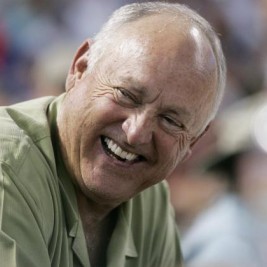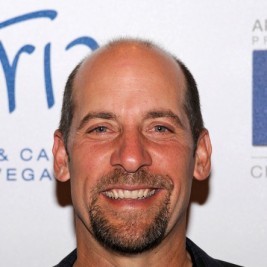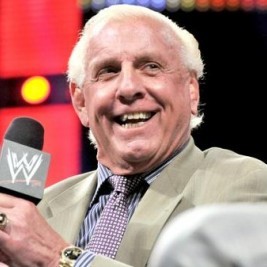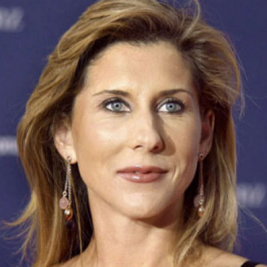
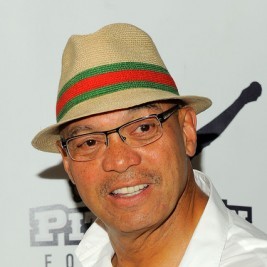
Corporate Appearances, Speaking Engagements, Autograph Signings, Endorsements, VIP Meet & Greets, Store Grand Openings
Book Reggie Jackson for a Speaking Engagement
Businesses, Non-profit organizations, event planners and companies across the country have worked closely with our booking agents to hire Reggie Jackson for a speaking engagements, guest appearances, product endorsements and corporate events. Many of those same clients have continued to turn to our speakers bureau as we can easily align Reggie Jackson’s availability with their upcoming seminar, gala, annual conference, corporate function, and grand opening. Our close relationship with Reggie Jackson’s booking agent and management team further enables us to provide inquiring clients with Reggie Jackson’s speaking fee and appearance cost.
If your goal is to hire Reggie Jackson to be your next keynote speaker or to be the next brand ambassador our celebrity speakers bureau can assist. If Reggie Jackson’s booking fee is outside your companies budget or your unable to align with his appearance availability, our booking agents can provide you a list of talent that aligns with your event theme, budget and event date.
His father, Martinez Jackson, was a Puerto Rican who played in the Negro Leagues. Reggie Jackson was inducted into the Baseball Hall of Fame in 1993 in recognition of his talents.
Reggie Jackson was born in Wyncote, Pennsylvania, just north of Philadelphia, but later made his home in Oakland, California. After graduating from Cheltenham High School in 1964, he attended Arizona State University on a football scholarship. He switched to baseball following his freshman year, impressing coach Bobby Winkles with his strength.
He was the second selection in baseball's 1966 amateur draft, chosen by the Kansas City Athletics. The New York Mets had the first pick, but chose Steve Chilcott, a catcher who had just graduated from high school in California. Jackson was told by Winkles that the Mets were nervous about drafting him because he had a white girlfriend; Jackson's girlfriend, Jennie Campos, was actually a Mexican-American. Jackson and Campos later married and divorced, and through 2005, he has never remarried. Chilcott played six years in the minor leagues before retiring. Through 2005, he is the only number-one pick in the baseball draft who retired without ever reaching the major leagues.
Jackson debuted in the major leagues with the A's on June 9, 1967, a 6-0 A's victory over the Cleveland Indians in Cleveland. Following that season, the Athletics moved to Oakland. Jackson hit 47 home runs in 1969, and was briefly ahead of the pace that Roger Maris set when he broke the single-season record for home runs with 61 in 1961, and that of Babe Ruth when he set the previous record of 60 in 1927. Jackson later said that the sportswriters were claiming he was "dating a lady named 'Ruth Maris.'"
Jackson hit a memorable home run in the 1971 All-Star Game at Tiger Stadium in Detroit. Batting for the American League against Pittsburgh Pirates pitcher Dock Ellis, the ball he hit soared above the right-field stands, striking the transformer of a light standard on the right field roof. In 1984, he would hit a home run over that roof
In 1971, the A's won the American League's Western Division title, their first first-place finish since 1931, when they played in Philadelphia. They lost the American League Championship Series to the Baltimore Orioles. The A's won the Division again in 1972; their series with the Tigers went five games, and Jackson scored the game-winning run in the clincher. In the process, however, he tore a hamstring and was unable to play in the World Series. The A's still managed to defeat the Cincinnati Reds in seven games. It was the first World Championship won by a San Francisco Bay Area team in any major league sport.
He helped the A's win the pennant again in 1973, and they defeated the Mets in seven games. This time, he was not only able to play, but his performance led to his being awarded the Series' Most Valuable Player award. The A's won the World Series again in 1974, defeating the Los Angeles Dodgers in five games. This Series marked the first time that two teams from the State of California played each other for a sport's World Championship, and, through 2005, the only time a team other than the New York Yankees has won three consecutive World Series. While playing in Philadelphia, the A's had won three straight pennants from 1929 to 1931, but lost the third World Series in that stretch after winning the first two.
The A's won the Division again in 1975, but the loss of pitcher Catfish Hunter, baseball's first modern free agent, left them vulnerable, and they were swept in the ALCS by the Boston Red Sox. With the coming of free agency after the 1976 season, and A's owner Charlie Finley being unwilling to pay the higher salary that Jackson would ask for, Finley traded Jackson to the Baltimore Orioles just before the start of the season. Both his new team, the Orioles, and his former team, the Athletics, finished second. But Finley's unwillingness to re-sign his stars at higher salaries led to the breakup of one of baseball's greatest teams, some dismal seasons, and very nearly the loss of the Oakland franchise. Finley nearly sold the team to buyers who would have moved them to Denver for the 1978 season and New Orleans for 1979 before selling them in 1980 to a group that kept them in Oakland.
The Yankees signed Jackson to a five-year contract, totaling $2.96 million, on November 29, 1976. Upon arriving in New York, the number 9 that he had worn in Oakland and Baltimore was worn by third baseman Graig Nettles. Jackson asked for number 42, in memory of Jackie Robinson. But manager Billy Martin brought his friend Art Fowler in as pitching coach, and gave him number 42. So, noting that all-time home run leader Hank Aaron had just retired, Jackson asked for and received number 44, Aaron's number.
Jackson's first season with the Yankees, 1977, was a difficult one. Although team owner George Steinbrenner and several players, most notably catcher and team captain Thurman Munson and outfielder Lou Piniella, were excited about his arrival, Martin was not. Martin had managed the Tigers in 1972 when Jackson's A's beat them in the playoffs. Jackson was once quoted as saying of Martin, "I hate him, but if I played for him, I'd probably love him."
The relationship between Jackson and his new teammates was strained due to an interview with Sport magazine writer Robert Ward. During spring training at the Yankees' camp in Fort Lauderdale, Florida, Jackson and Ward were having drinks at a nearby bar. Jackson's version of the story is that he noted that the Yankees had won the pennant the year before, but lost the World Series to the Reds, and suggested that they needed one thing more to win it all, and pointed out the various ingredients in his drink. Ward suggested that Jackson might be "the straw that stirs the drink." But when the story appeared in the May 1977 issue of Sport, Ward quoted Jackson as saying, "This team, it all flows from me. I'm the straw that stirs the drink. Maybe I should say me and Munson, but he can only stir it bad." Jackson has consistently denied saying anything negative about Munson in the interview. But, as Munson was beloved by his teammates, Martin, Steinbrenner and Yankee fans, the relationships between them and Jackson became very strained.
On June 18, the Yankees played the Boston Red Sox in a nationally-televised game at Fenway Park in Boston. Jim Rice, a powerful hitter but a slow runner, hit a ball into right field that Jackson seemed to get to without much speed, and Rice reached second base. Furious, Martin removed Jackson from the game without even waiting for the end of the inning, sending Paul Blair out to replace him. When Jackson arrived at the dugout, Martin yelled that Jackson had shown him up. They argued, and Jackson said that Martin's heavy drinking had impaired his judgment. Despite Jackson being eighteen years younger, about four inches taller and maybe forty pounds heavier, Martin lunged at him, and had to be restrained by coaches Yogi Berra and Elston Howard. Red Sox fans could see this in the dugout and began cheering wildly, and the NBC TV cameras showed the confrontation to the entire country.
Yankee management managed to defuse the situation by the next day, but the relationship between Jackson and Martin was permanently poisoned. Nevertheless, late in the season, after resisting requests from various sources to do so, Martin put Jackson in the fourth position in the batting order, the "cleanup" position. Jackson's hitting improved, and the team went on a winning streak. On September 14, while in a tight three-way race for the American League Eastern Division crown with the Red Sox and Orioles, Jackson ended a game with the Red Sox by hitting a home run off Reggie Cleveland, giving the Yankees a 2-0 win. The Yankees won the division by two and a half games over the Red Sox and Orioles, and beat the Kansas City Royals to win the pennant.
During the World Series against the Dodgers, Munson was interviewed, and suggested that Jackson, because of his past postseason performances, might be the better interview subject. "Go ask Mister October," he said, giving Jackson a nickname that would stick. Jackson hit home runs in Game 4 and Game 5 of the Series. His crowning achievement came with his three-home-run performance in Game 6, each on the first pitch, off three different Dodger pitchers. The first came off starter Burt Hooton, and was a high-arcing shot into the lower right field seats at Yankee Stadium. The second was a line drive off reliever Elias Sosa into roughly the same area. With the fans chanting his name, "Reg-GIE! Reg-GIE! Reg-GIE!" the third came off reliever Charlie Hough, a knuckleball pitcher, making the distance of this home run particularly remarkable. It was a towering drive into the black-painted "hitter's background" seats in center, 475 feet away, one that stunned the ABC Television sportscasters covering it:
Tom Seaver (interrupting): Good-BYE, that's WAY out...
As the ball bounced into the black bleachers, the first time a player had hit those stands in Yankee Stadium's post-renovation configuration...
Howard Cosell: Oh, what a blow! What a way to top it off! Forget about who the Most Valuable Player is in the World Series. How this man has responded to pressure! Oh, what a beam on his face. How can you blame him? He's answered the whole WORLD! After all the furor, after all the hassling, it comes down to this!
Jackson became the first player to win the World Series MVP award for two different teams. In 27 World Series games, he amassed 10 home runs, including five in a row during the 1977 Series, 24 RBI and a .357 batting average.
The Yankees' home opener of the 1978 season, on April 13 against the Chicago White Sox, featured a new product, "the Reggie Bar." Jackson had once said, "If I played in New York, they'd name a candy bar after me." Someone did, a circular "bar" of peanuts dipped in caramel and covered in chocolate. The Reggie bars were handed to fans as they walked into Yankee Stadium. Jackson hit a home run, and when he returned to right field the next inning, fans began throwing the Reggie bars on the field in celebration. Jackson told the press that this confused him, thinking that maybe the fans didn't like the candy. The Yankees won the game, 4-2.
But the Yankees could not maintain their success, as manager Billy Martin lost control. After suspending Jackson for disobeying a sign on July 17, on July 23 Martin made a statement about his two main antagonists, referring to comments Jackson had made and team owner George Steinbrenner's 1972 violation of campaign-finance laws: "They're made for each other. One's a born liar, the other's convicted." It was moments like these that gave the Yankees the nickname "The Bronx Zoo."
Martin resigned the next day, and was replaced by Bob Lemon, a member of the Hall of Fame for his pitching prowess with the Cleveland Indians. Steinbrenner, a Cleveland-area native, had hired former Indians star Al Rosen as his general manager, and when Rosen noted that Lemon had recently been fired as the White Sox manager, Steinbrenner jumped at the chance to have another hero of his youth involved with the Yankees.
The Yankees were 14 games behind the first-place Red Sox on July 18, but finished in a tie for first place. The two teams played a one-game playoff for the division title at Fenway Park, with the Yankees winning 5-4. Although the home run by light-hitting shortstop Bucky Dent in the seventh inning got the most notice, it was an eighth-inning home run by Jackson that gave the Yankees the fifth run they ended up needing. The next day, with the American League Championship Series with the Royals beginning, Jackson hit a home run off the Royals' top reliever at the time, Al Hrabosky, the flamboyant "Mad Hungarian." The Yankees won the pennant in four games, their third straight.
Jackson was once again in the center of events in the World Series, again against the Dodgers. The Dodgers won the first two games, taking the second when rookie reliever Bob Welch struck Jackson out with the bases loaded with two outs in the ninth inning. The Yankees won Game 3 on several fine defensive plays by third baseman Graig Nettles, and took Game 4 in ten innings. The key play came in the sixth inning when Lou Piniella hit a pop-up with Jackson on first. Jackson had to stop between bases, not knowing if the ball would be caught. It wasn't, and Dodger shortstop Bill Russell threw to first. The ball hit Jackson on the right hip and caromed away. Jackson was automatically out, but Piniella reached first and advanced to second, with Thurman Munson scoring. Dodger manager Tommy Lasorda argued with the umpires, saying that Jackson intentionally interfered and that Piniella should also be declared out. The umpires did not change their call, and the Yankees went on to win. The Yankees won the series in Game 6, with Jackson getting revenge on Welch with a home run.
In 1980, Jackson batted .300 for the first and only time in his career, and his 41 home runs tied with Ben Oglivie of the Milwaukee Brewers for the American League lead. In 1981, the last year of his Yankee contract, Jackson hit a key home run in the strike-forced Division Series with the Brewers, and the Yankees went on to win the pennant again. This time they lost the World Series to the Dodgers.
Because of various disagreements, Steinbrenner chose not to re-sign Jackson. The owner of the California Angels, legendary entertainer Gene Autry, had heard of Jackson's desire to return to California to play, and signed him to a five-year contract. On April 27, 1982, in Jackson's first game back at Yankee Stadium with the Angels, he broke out of a terrible season-starting slump to hit a home run off former teammate Ron Guidry. The at-bat began with Yankee fans, angry at Steinbrenner for letting Jackson get away, starting the "Reg-GIE!" chant, and ended it with the fans chanting "Steinbrenner sucks!" By the time of Jackson's election to the Hall of Fame, Steinbrenner had begun to say that letting him go was the biggest mistake he has made as Yankee owner.
That season, the Angels won the American League West, and would do so again in 1986, but lost the American League Championship Series both times. On September 17, 1984, on the 17th anniversary of the day he hit his first home run, he hit his 500th, at Anaheim Stadium off Bud Black of the Royals.
In 1987, he signed a one-year contract to return to the A's, wearing the number 44 with which he was now most associated rather than the number 9 he previously wore in Oakland. He announced he would retire after the season, at the age of 41. In his last at-bat, at Comiskey Park in Chicago on October 4, he collected a broken-bat single up the middle, but the A's lost to the White Sox, 5-2.
Jackson played 21 seasons and reached the postseason in 11 of them, winning six pennants and five World Series. His accomplishments include winning the both the regular-season and World Series MVP awards in 1973, hitting 563 career home runs, maintaining a .490 career slugging percentage, being named to 14 All-Star teams, and the dubious distinction of being the all-time leader in strikeouts with 2,597.
During the spare time of his active career, Jackson worked as a field reporter and color commentator for ABC Sports. During the 1980s, Jackson was given the task of presiding over the World Series Trophy presentations. He also made cameo appearances in the films The Naked Gun: From the Files of Police Squad! and BASEketball.
Jackson would also speak out on race relations, lobbying baseball teams to reach out to black former players to hire them as managers, coaches, scouts and front-office executives. On a lighter note, he likes to say, citing Hispanic as well as African heritage, "When I was a boy, I was 'colored.' As a teenager, I was a 'Negro.' As a young man, I was 'black.' As an older man, I was 'African-American.' Now that I'm an old man, I'm 'multi-cultural.'"
Jackson and Steinbrenner would reconcile, and Steinbrenner would hire him as a "special assistant to the principal owner," making Jackson a consultant and a liaison to the team's players, particularly the minority players. By this point, the Yankees, long noted for being slow to adapt to changes in race relations, have come to develop many minority players in their farm system and seek out others via trades and free agency. Jackson usually appears in uniform at the Yankees' current spring training complex in Tampa, Florida, and has been sought out for advice by current stars such as Derek Jeter and Alex Rodriguez.
The Yankees retired his uniform number 44 on August 14, 1993, shortly after his induction into the Baseball Hall of Fame. The Athletics retired his number 9 on May 22, 2004.
In 1999, Jackson placed 48th on The Sporting News' list of "The 100 Greatest Baseball Players." That same year, he was named one of 100 finalists for the Major League Baseball All-Century Team, but was not one of the 30 players chosen by the fans.
The Yankees dedicated a plaque in his honor on July 6, 2002, which now hangs in Monument Park at Yankee Stadium. The plaque calls him "One of the most colorful and exciting players of his era" and "a prolific hitter who thrived in pressure situations." Each Yankee so honored and still living was on hand for the dedication: Phil Rizzuto, Yogi Berra, Whitey Ford and Don Mattingly. Ron Guidry, a teammate of Jackson's for all five of his seasons with the Yankees, was there, and would be honored with a Monument Park plaque the next season. Out of respect to some of the players who Jackson admired while growing up, Jackson invited Willie Mays, Hank Aaron and Ernie Banks to attend the ceremony, and each did so. Like Jackson, each was a member of the Hall of Fame and had hit over 500 career home runs. Each had also played in the Negro Leagues.
Jackson expanded his love of antique cars into a chain of auto dealerships in California, and used his contacts to become one of the foremost traders of sports memorabilia. He has also been the public face of a group attempting to purchase a major league team, already having made unsuccessful attempts to buy the Athletics and the Angels. His attempt to acquire the Angels along with Jimmy Nederlander, Jackie Autry and other luminaries was thwarted by Mexican American billionaire Arturo Moreno who outbid Jackson's group by nearly $50 million for the team in the winter of 2002.

Let our team of booking agents help create a memorable experience with hiring Reggie Jackson for your store grand opening, golf outing, trade show booth or corporate outing.
NOPACTalent acts as a Celebrity Speakers Bureau and Athlete Booking agency for corporate functions, appearances, private events and speaking engagements. NOPACTalent does not claim or represent itself as Reggie Jackson’s speakers bureau, agent, manager or management company for Reggie Jackson or any celebrity on this website. NOPACTalent represents organizations seeking to hire motivational speakers, athletes, celebrities and entertainers for private corporate events, celebrity endorsements, personal appearances, and speaking engagements.



